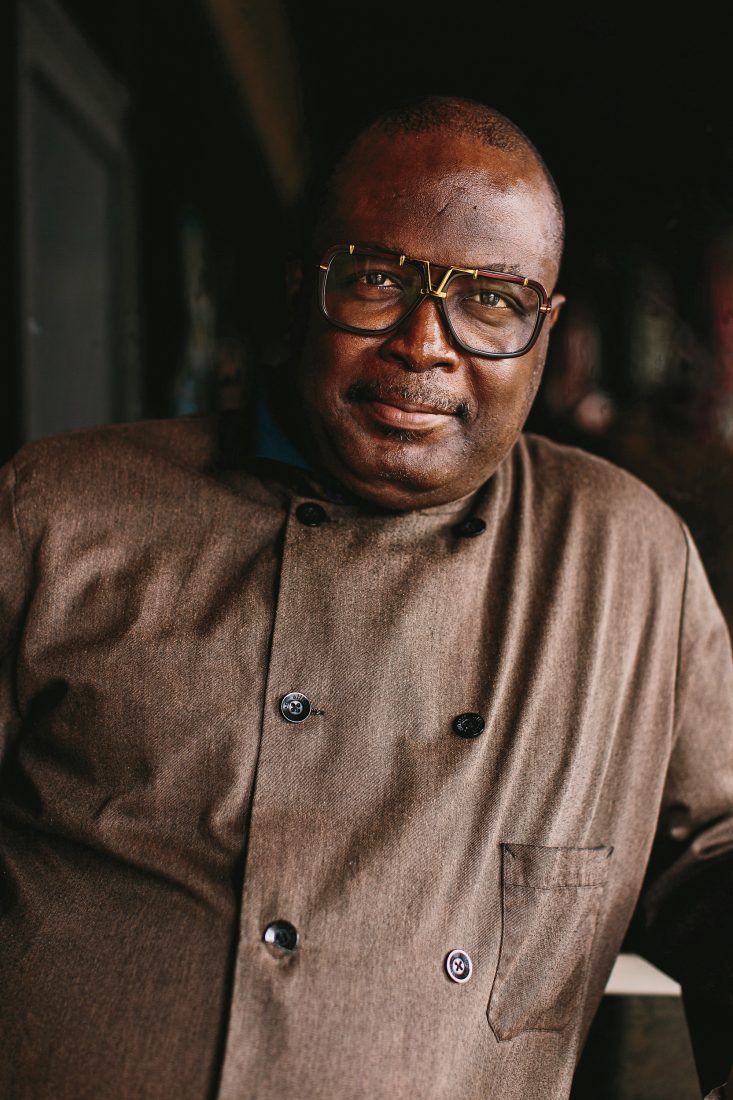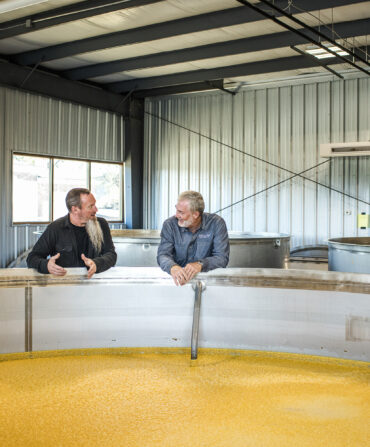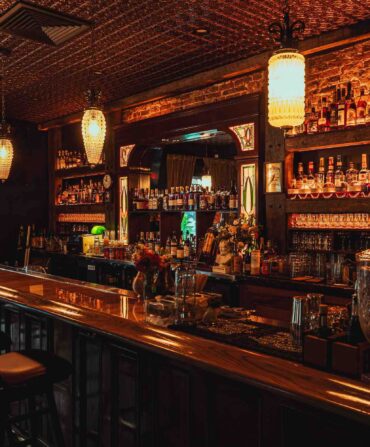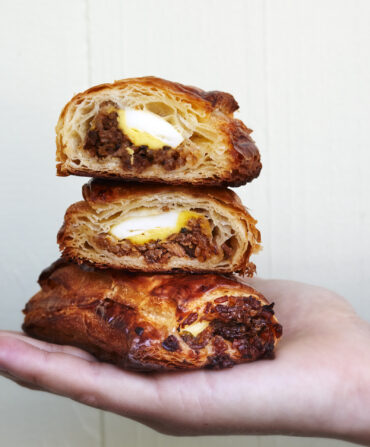On a recent Sunday night at FAD, a restaurant in the northwestern Atlanta suburbs run by Nigerian émigré Ade “Fad” Faderin, a young customer who traces her ancestry to the Edo people chatted up a waitress of Yoruba descent. As I tried to form a divot in a marble-white ball of fufu and, following the style of my tablemate, scoop a taste of habanero-perfumed okra soup, they talked about the differences between fufu made with pounded yam and the version made with cassava.

Photo: Andrew Thomas Lee
Patrons line the bar.
Afropop beats and highlife horns blared from the speakers. Nollywood films made in Lagos flashed across a big-screen television. On a smaller set, the Jesus Channel, broadcast from Ghana, played with the sound muted. Dressed in a chef coat, his soft eyes framed by mod glasses, his broad face creased by a welcoming smile, Faderin shook hands, slapped backs, and occasionally stopped to shoot a game of pool with a steady stream of customers who arrived to pick up carryout clamshells of on-the-bone goat, swamped in a bright tomato stew.
FAD is dizzying, even disorienting. Set behind a Waffle House, in the back corner of a strip shopping center that houses branches of four Nigerian-based churches, the restaurant serves as a pub, clubhouse, and banquet hall for the West Africans who call suburban Cobb County home. Natives of Ghana commune with immigrants from Nigeria. Cameroonians share the bar with Senegalese.
The interior is a riot of imagery. Multicolored maps, mounted inside the front door, serve as global geography refreshers. Tacked alongside, plastic-coated ranks of West African currency look as if they were installed by a high-school teacher to illustrate a civics lesson. The flag of Liberia, defined by alternating red and white stripes and a blue canton, recalls the American flag and reminds all that the nation was founded by freed American and Caribbean slaves. Album covers from the 1980s, when Faderin fell in love with American pop music, blanket the bathroom hallway. Boy George gets good play. So does the sound track from Flashdance. Flags tacked above the bar herald Chelsea, Arsenal, and other British soccer clubs, reminders of the long colonial rule of Great Britain, which came to a close in the early 1960s.
Enough about the circus. FAD is worthy of culinary attention, too, for West Africa may be the next big thing in Southern food. Two recent books set the tone for curious eaters. Senegal: Modern Senegalese Recipes from the Source to the Bowl, by Pierre Thiam, makes explicit links between thieboudienne, a rice-vegetable-fish composition, and the jambalayas of Louisiana. The Ghana Cookbook, by Fran Osseo-Asare, reveals connections between the hot-water cornbread of the American South and kenkey, a Ghanian steamed cornbread.

Photo: Andrew Thomas Lee
A World of Flavor
A bowl of suya, smoked beef brisket with onion and cayenne.
West African restaurateurs such as Faderin connect these worlds in ways that books can’t. Order a Homeboy Special—black-eyed peas, threaded with onions, cooked down to a pulp with palm oil, served with a bright chile sauce—and the South comes alive on your palate. Fork into a plate of jollof rice, blushed with tomatoes, spiked with habanero, and cooked until each grain stands distinct, and you confront the red rice long popular in Savannah and other citadels of Lowcountry cooking. Get the stewed gizzards and you recognize the protocousin of the fried gizzards sold at Deep South convenience stores. Dinner at FAD offers a glimpse at the ways that West African cooks, ingredients, and techniques have shaped what we now think of as Southern food.
You most likely recognize the argument I’m building. The South is as West African as it is Western European. Probably more so. Our everyday language offers multiple examples. Juke has its likely roots in the Wolof word jug, or the Bambara word jugu, meaning “disorderly” or “naughty” or similar. More to the point of my dinner, our word gumbo has roots in the Bantu languages, in which okra is known as ngumbo or gombo. As my friend the foodways scholar Jessica B. Harris likes to say, “Okra forever points its green spine toward Africa.”
Allow me to point you toward FAD’s okra stew, perfumed with dried shrimp. Listed as okro on the menu, it’s thick, trails from your spoon in long tendrils, and is flat-out delicious. So is the suya, which translates as beef brisket barbecue, smoked out back on a barrel cooker stoked with charcoal. Sliced into fat-edged lozenges and served with crescents of white onion, a saucer of powdered cayenne, and a brace of toothpicks, it tastes like a chewy Nigerian take on Texas patrimony, reimagined for a United Nations cocktail party.
Dinner at FAD will deepen your understanding of the roots and routes of Southern food and reinforce that ours is a world cuisine, not mere provincial cookery. Go get your fufu on.
John T. Edge, writer and host of the television show TrueSouth, began contributing to Garden & Gun in its first year of publication. He is the author of The Potlikker Papers: A Food History of the Modern South and House of Smoke.
Garden & Gun has affiliate partnerships and may receive a portion of sales when a reader clicks to buy a product. All products are independently selected by the G&G editorial team.








